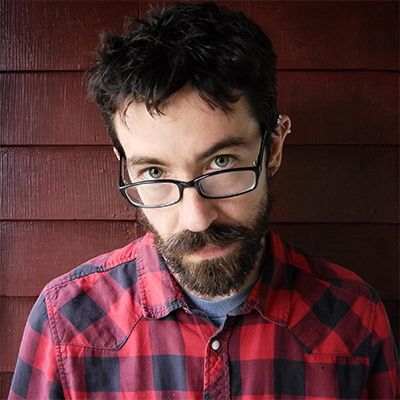“Writing is the Last Thing I Do”: 5 Questions for Hugh Ryan
By Craig Morgan Teicher
Hugh Ryan graduated from the Bennington Writing Seminars in 2009 and went on to publish two acclaimed books of nonfiction, When Brooklyn Was Queer (2019) and The Women’s House of Detention: A Queer History of a Forgotten Prison, which won the Stonewall Book Award/Israel Fishman Award for Nonfiction and the Warren Johansson Award. He has taught nonfiction at the Writing Seminars since 2022, and just sold his next book, Becoming History, a memoir in essays. He talked with me about turning research into writing and falling back in love with the essay.

Your books are based on copious research. Could you explain to those of us accustomed to making up our information—fiction writers and poets, for instance—and to nonfiction writers as well, what your writing process is like?
Writing is the last thing I do. For my first book, I spent six years researching before I started writing. With the more recent one, it was four years. I am trying to dislocate myself and see the world through another set of eyes, and that's a really slow process. Usually in the beginning of a book project, I try to isolate certain archives that I'm going to be working from, or collections, so I have some boundaries. Then I’m swimming in the material for years. I'll spend every day, six hours a day going through files, and I create these giant spreadsheets. That helps me to see the arc of what is happening. This research gives me the shape of the book, and then I figure out the other things. I chart it out in all these different ways. I make Excel sheets, I plot it on maps, I make timelines, and then I start to turn those timelines into possible chapter ideas.
That’s amazing—so the writing really follows and bubbles out of the research…
Writing is not something I have to do every day. Reading is. I'm not the best writer. I'm a totally good writer. But my strongest suit is as a reader. I am a fantastic reader and I love reading, and I have to do it every day. I have to not just read every day, but think critically about what I'm reading, even if it's just to make stupid notes to myself about a book I will never write about, that I'll probably never talk to anyone about. But that is critical to me.
Your next book is a collection of essays, unlike your first two, which are book-length histories. Can you talk a bit about your relationship with the essay?
Becoming History is a memoir in essays. My relationship with the essay changed with publication of my first book, When Brooklyn Was Queer. I had been publishing essays and articles, but the book really crystallized things. Nothing else I had published got a lot of attention in any way. There was never a moment where people were like, "Oh, that essay is so good, you're an essayist." But when I published that book, people said, "Oh, that book is so good, you're a historian." Suddenly I had a title. And that opened up lots of doors and also helped me to understand the kind of writing I wanted to do.
As a student at Bennington, had you envisioned writing these heavily researched books?
I came to Bennington to write essays. At that time in the program, the nonfiction writers were very into memoir, and everyone was talking about their trauma, and I thought that's where I had to go. So I wrote maudlin trauma essays that were very beautiful in sentence and structure, but lacked plots and were also very one-sided. But then I graduated and those essays didn’t feel true to me either, and they're less fun. So I decided, I'm just not going to do this anymore. I don't want to write about myself. I don't know how to do it. I feel uncomfortable doing it. Growing up queer in the '80s and '90s, I just got used to never wanting to disclose anything about myself. I would just rather not talk.
How did you find your way back to the essay?
In 2018, Bennington brought me back to do a workshop and I got to go to all of these readings, and I was so inspired listening to these essays. I remembered: I love essays! I had forgotten that in all of this time of feeling unhappy with the ones I’d written earlier. I realized I really do want to write essays, I just don’t know exactly how yet. That moment felt very much like when I first entered the program. Now I had more skills and more experiences, but I still had to figure out how to write a kind of essay I liked. So on the way home on the Amtrak, I sat down and I wrote. Then I put the piece away for three years, because I didn't know what it was and I didn't know what to do with it. And then I came back to it when I was hired to teach at Bennington, because, yet again, I had all of these students who were writing essays. If I really want to be able to say to these students, "Here's what an essay is, and here, how it works," I've got to put my mouth where my money is.